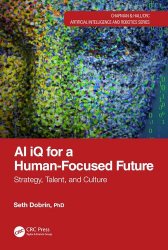 Название
Название: AI iQ for a Human-Focused Future: Strategy, Talent, and Culture
Автор: Seth Dobrin
Издательство: CRC Press
Серия: Chapman & Hall/CRC Artificial Intelligence and Robotics Series
Год: 2025
Страниц: 265
Язык: английский
Формат: pdf (true)
Размер: 10.2 MB
AI iQ for a Human-Focused Future: Strategy, Talent, and Culture offers a pioneering approach to integrating Artificial Intelligence (AI) and Generative AI (GenAI) in business, emphasizing a business strategy first mindset over a technology-centric one.
The book challenges the usual hype surrounding AI, advocating for a more realistic perspective. It delves into the evolution of AI, from traditional Data Science and Machine Learning to GenAI, all through the lens of strategic business application. Unlike other texts, it moves away from case studies, favoring practical, real-world advice from extensive field experience. The book presents strategies for creating an environment that not only accepts but thrives on AI, focusing on strategic leadership, talent development, and inclusivity. It highlights crucial roles, such as the Chief AI Officer, and emphasizes the importance of diversity in AI teams.
In November 2022, GenAI took off when OpenAI released ChatGPT. This conversational interface allows anyone who can type or speak to interact with the model. ChatGPT was initially a front end for GPT-3 (Generative Pre-trained Transformer version 3). The GPT models have been around and accessible to the AI and software development communities since 2017, more than five years before the release of ChatGPT. The advent of the technology goes back even further than that. GenAI is not a new technology. ChatGPT is merely a way for the public to use GenAI. Like statistics, Machine Learning, and Deep Learning, GenAI is part of a hierarchy as well. The base of the hierarchy is Deep Learning. The first layer under that is a concept known as foundation models. These Deep Learning models are pre-trained on an extensive data set (in the case of ChatGPT, a considerable portion of the internet). Foundation models train on a specific domain. Then, one can apply the model to their proprietary data to get the power of the extensive data without having the data, the skill, or the resources it took to build the foundation model. GenAI is a foundation model pre-trained on vast data sets to generate new data. GenAI comes in multiple flavors: language, speech, text, image, video, 3D images, and scientific-focused models (genetics, chemistry, pharmaceuticals, etc.). To sum this up. ChatGPT is a large language model, a kind of GenAI, and various foundation models, Deep Learning, and Machine Learning models, all based on statistics.
Some examples of the different GenAI models you may be familiar with are as follows:
• Large Language Models (LLM): Bard, ChatGPT, and Claude
• Text to Image: DALL-E, Stable Diffusion, and Midjourney
• Text to Video: Stable Diffusion Video
This transition from the old-school AI of Data Science and Machine Learning to the new school of GenAI represents a profound transformation in our understanding and application of AI. Whereas traditional AI is about understanding and predicting the world based on existing data, GenAI is about creating new realities, content, and possibilities. It’s a shift from reactive to proactive, from understanding to creating. GenAI models, using advanced algorithms, are now capable of synthesizing text, generating realistic images, and even composing music, tasks that were once deemed exclusively human.
Uniquely, each chapter concludes with key takeaways, offering actionable steps and implementation tips. This practical approach transforms theoretical concepts into actionable business strategies, providing leaders with the tools to apply AI initiatives effectively in their organizations.
This book is more than an informative resource; it's a practical toolkit for any business leader aiming to navigate the evolving landscape of AI and GenAI, ensuring their organization is prepared for sustainable growth and success in an AI-driven future.
Скачать AI iQ for a Human-Focused Future: Strategy, Talent, and Culture
[related-news]
[/related-news]